Russia-Ukraine war: risk of radioactive leak at ‘repeatedly shelled’ Zaporizhzhia nuclear plant, operator warns – live
Risk of radioactive leak at Zaporizhzhia nuclear plant, says operator
Ukraine’s state energy operator has warned that there is a risk of a radioactive leak at the Russian-occupied Zaporizhzhia nuclear power plant in Ukraine.
Moscow’s troops have “repeatedly shelled” the site of the nuclear plant over the past day, Energoatom said.
As of midday on Saturday local time (9am GMT) the plant “operates with the risk of violating radiation and fire safety standards”, the operator said in a statement.
Energoatom said:
As a result of periodic shelling, the infrastructure of the station has been damaged, there are risks of hydrogen leakage and sputtering of radioactive substances, and the fire hazard is high.
Russia’s defence ministry has claimed Ukraine’s troops “shelled the territory of the station three times” in the past day.
Key events
Gemma McSherry
The UK is giving underwater drones to Ukraine and training Ukrainian personnel in Britain to use them to clear their coastline of mines, the Ministry of Defence has announced.
Dozens of Ukrainian personnel will be taught to use the autonomous minehunting vehicles by the Royal Navy and US partners over the coming months, with some already commencing their training.
Six autonomous minehunting vehicles are being sent to search for Russian mines in the waters off its coast. Three vehicles are due to be sent from UK stocks while another three will be bought from industry.
The lightweight autonomous vehicle can be used in shallow coastal environments and are designed to operate at depths of up to 100 metres to detect, locate and identify mines through the use of a series of sensors.
Kazakhstan, a neighbour and ally of Russia, has suspended all arms exports for a year, its government said, amid conflict in Ukraine and western sanctions against Moscow.
The former Soviet republic – which also has active economic ties with Kyiv – has avoided taking sides in the Ukrainian crisis while calling for its peaceful resolution.
The country’s government did not give a reason in Saturday’s statement for the decision to halt arms exports, Reuters reports.
Kazakhstan produces a wide range of military equipment including boats, armoured and artillery vehicles, machine guns, night visors, grenades, torpedoes and protective gear.
The government has not said these items were being exported.
Faisal Ali
Poland and the Czech Republic have agreed to protect the airspace of their Nato ally Slovakia, as it upgrades its air force from its legacy Soviet-made MiG-29 fighters to a new batch of F-16 jets from the US.
The agreement is due to come into effect at the beginning of September and will last a year and a half, the defence ministers of the countries agreed at a meeting during the Slovak International Air Fest.
Slovakia has expressed a willingness to transfer the grounded planes to Ukraine but the defence minister, Jaroslav Nad, said no deal had been reached with Kyiv.
Nad said: “The possibility is on the table, and once there is an agreement we will inform you.”

Emma Graham-Harrison
The woods outside Chernihiv were quiet in late August when Anatoliy Pavelko scrambled into a 10-metre bomb crater with a trowel and an icebox full of sample jars. He wanted to find out what the Russian FAB-250 bomb left behind when it carved this gaping hole into the ground in the spring.
Four months earlier, the environmental lawyer was dug in on a frontline just a few kilometres away, shells crashing around him in the bitter fight to keep Russian forces out of Kyiv.
Now he has taken temporary leave from his unit of volunteers and returned to Chernihiv for a more familiar battle on a different front in the war against Moscow.
Russia’s invasion has killed tens of thousands of Ukrainians and destroyed homes and entire cities. It is also devastating Ukraine’s environment, an “ecocide” that activists worry is going largely unrecorded amid the broader national tragedy.
Summary of the day so far
It’s 6pm in Kyiv. Here’s where we stand:
-
Concern about the potential for a radiation leak at Zaporizhzhia nuclear power plant is persisting. Ukraine’s state energy operator has warned that there are “risks of hydrogen leakage and sputtering of radioactive substances” at the Russian-occupied plant. Authorities were distributing iodine tablets to residents who live near the plant in case of radiation exposure.
-
Russia and Ukraine have accused each other of shelling the area around Europe’s largest nuclear plant. Moscow’s troops have “repeatedly shelled” the site of the nuclear plant over the past day, the Ukrainian state nuclear company, Energoatom, said. Russia’s defence ministry has claimed Ukraine’s troops “shelled the territory of the station three times” in the past day.
-
A team of inspectors from the UN nuclear watchdog is poised to make an emergency visit to the Zaporizhzhia plant, according to reports. Sources have told the Wall Street Journal it is “almost certain” that a mission from the International Atomic Energy Agency will visit the plant early next week, although details are still being finalised.
-
Volodymyr Zelenskiy has issued a statement marking Ukraine’s Aviation Day, in which he pledged that Kyiv’s troops will “destroy the occupiers’ potential step by step”. The Ukrainian president vowed that the Russian “invaders will die like dew on the sun”.
-
Russia has probably increased the intensity of its attacks in the Donetsk area of eastern Ukraine’s Donbas region over the past five days, according to British intelligence. Pro-Russia separatists have most likely made progress towards the centre of Pisky village, near Donetsk airport, but Russian forces overall had secured few territorial gains, the latest report from the UK Ministry of Defence says.
-
Russia has blocked an agreement at the UN that was aimed at bolstering the nuclear non-proliferation treaty (NPT). The failure to agree to a joint statement, due to Moscow’s objection to a clause about control over the Zaporizhzhia power plant, is the latest blow to hopes of maintaining an arms control regime and keeping a lid on a rekindled arms race.
-
Ukrainian sailors will be allowed to leave the country for work, the country’s cabinet of ministers has said. The prime minister, Denys Shmyhal, said men of draft age employed as crew members will be allowed to leave the country so long as they have permission from their local conscription offices to cross the border.
-
Britain’s defence ministry has said it is giving six underwater drones to Ukraine to help clear its coastline of mines and make grain shipments safer. In addition, dozens of Ukrainian navy personnel will be taught to use the drones over the coming months, the ministry said.
Faisal Ali
A Russian rocket hit Kharkiv’s historic district in the early hours of Saturday, leaving one person injured, according to police.
The rocket damaged nearby buildings, leaving a large crater in the road. A local police officer told Reuters:
There are no military objects, no military equipment. Only residential buildings with regular citizens near the place of impact.
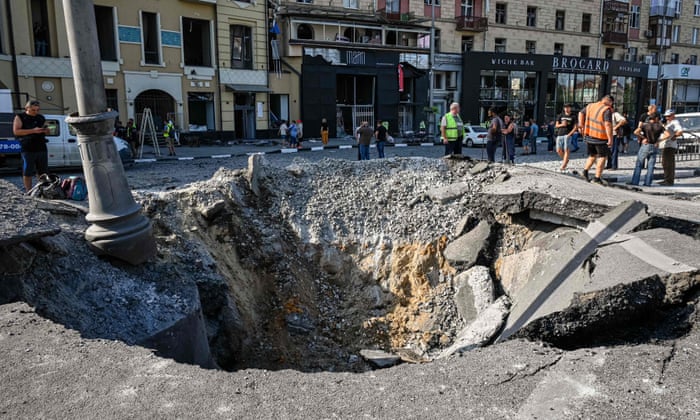
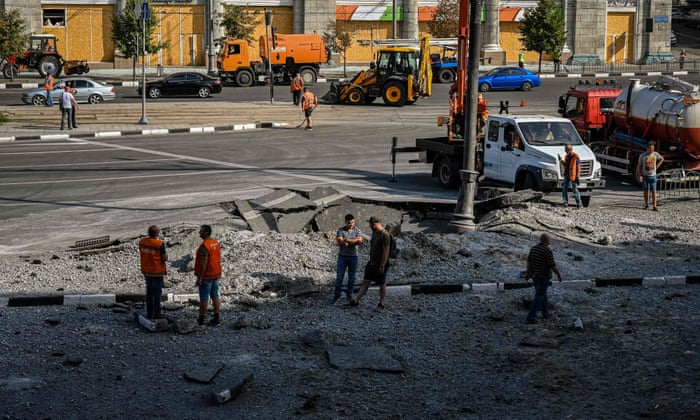
Tetiana Zviahintseva, a local shopkeeper who was sweeping scattered shards of broken glass in her store, said:
Horror and nightmare – they [Russians] torture our city. The endless shelling exhausted everybody.
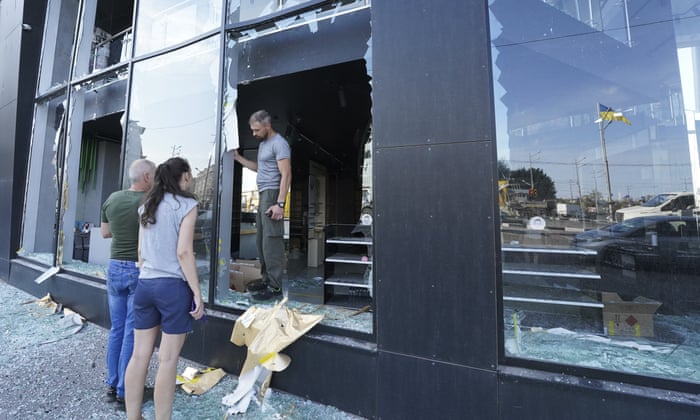
Zelenskiy: Russian ‘invaders will die like dew on the sun’
Ukraine’s president, Volodymyr Zelenskiy, has issued a statement marking the country’s Aviation Day, in which he pledged that Kyiv’s troops will “destroy the occupiers’ potential step by step”.
The Ukrainian leader posted a series of photos dedicated to the country’s air force and vowed that the Russian “invaders will die like dew on the sun”.
Zelenskiy said:
Ukrainian soldiers will destroy the occupiers’ potential step by step, and the day will come when the enemy will perish in Zaporizhzhia, in the south, in the east of the country, and in Crimea.
The invaders will die like dew on the sun, and our defence is and will be this sun. Happy Ukraine Aviation Day!
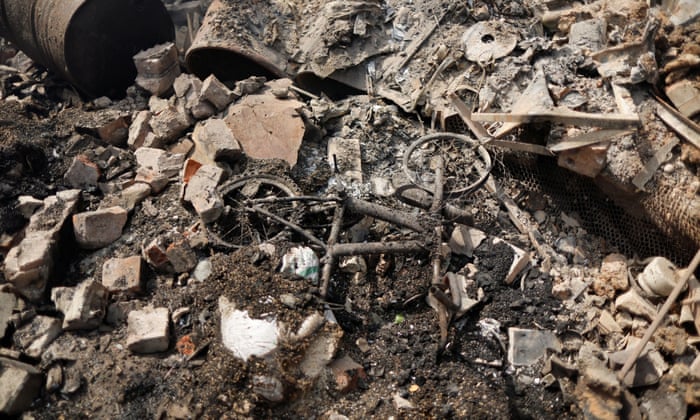
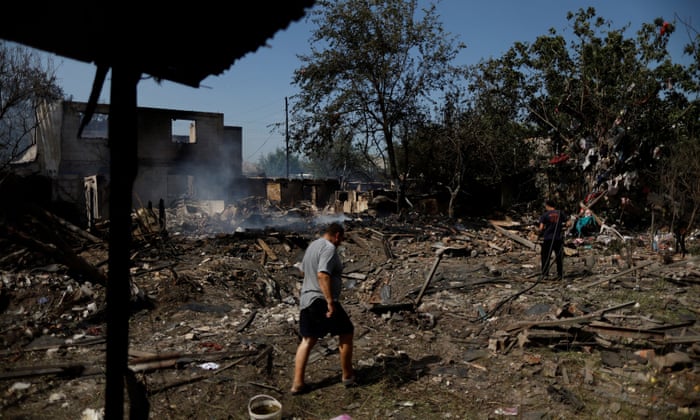
Ukraine’s military command said its forces have beaten back assaults by Russian forces around Soledar, Zaitseve and Mayorsk in the Donetsk region.
Ukraine’s southern military command reported that a Ukrainian air strike destroyed a Russian air defence system in the Kherson region, while the Antonovsky and Daryivskiy bridges remained unusable by heavy vehicles after previous strikes, Reuters reports.
In its daily briefing the Russian defence ministry said it had destroyed a large ammunition depot in Ukraine’s Dnipropetrovsk region that had contained US-made Himars rocket systems and shells for M777 howitzers, Reuters reports.
The Russian air force also claims to have shot down a MiG-29 aircraft in the eastern Donetsk region and to have destroyed another six missile and artillery weapons depots in the Donetsk, Mykolaiv and Kherson regions.
Reuters reports two South Korean companies have signed a $5.76bn contract with Poland to export tanks and howitzers, Seoul’s arms procurement agency said. This comes after Warsaw agreed to ramp up arms imports amid tensions with Russia.
Ukrainian sailors will be allowed to leave the country for work, the Kyiv Independent reports.
The cabinet of ministers of Ukraine has announced that sailors will be allowed to travel abroad for work. The prime minister, Denys Shmyhal, said men of draft age employed as crew members will be allowed to leave the country so long as they have permission to cross the border from their local conscription offices.
Until now, men aged 18 to 60 who were capable of military service were not allowed to travel outside Ukraine. According to Shmyhal, more than 100,000 Ukrainians work in the shipping industry
Ukrainian sailors have been working to encourage the authorities to release them to work abroad, with some sailors recording videos with their wives and children with messages for Ukraine’s president, Volodymyr Zelensky, requesting the right to work overseas.
From 1 September, sailors will be allowed to leave Ukraine for business trips for up to seven days.
Risk of radioactive leak at Zaporizhzhia nuclear plant, says operator
Ukraine’s state energy operator has warned that there is a risk of a radioactive leak at the Russian-occupied Zaporizhzhia nuclear power plant in Ukraine.
Moscow’s troops have “repeatedly shelled” the site of the nuclear plant over the past day, Energoatom said.
As of midday on Saturday local time (9am GMT) the plant “operates with the risk of violating radiation and fire safety standards”, the operator said in a statement.
Energoatom said:
As a result of periodic shelling, the infrastructure of the station has been damaged, there are risks of hydrogen leakage and sputtering of radioactive substances, and the fire hazard is high.
Russia’s defence ministry has claimed Ukraine’s troops “shelled the territory of the station three times” in the past day.
Hungary has issued regulatory approval for the construction of two new nuclear reactors by the Russian state-owned company Rosatom, Hungary’s foreign minister, Péter Szijjártó, announced yesterday.
The £10.6bn construction of two nuclear reactors will begin in the coming weeks, as part of a 2014 deal between Moscow and Budapest aimed at expanding Hungary’s existing Paks nuclear plant.
Szijjártó said on Facebook:
This is a big step, an important milestone. We can now move from planning stage to construction. You’ll see that at the Paks site in the coming weeks.
He added it is “realistic” that the new reactors could enter service by 2030.
Russia’s nuclear industry has not been included in EU sanctions over its invasion of Ukraine, and the fact that the construction is moving forward has been seen as another sign of the close ties between Hungary’s leader, Viktor Orbán, and Russia’s Vladimir Putin.
Russia and Ukraine accuse each other of shelling around Zaporizhzhia nuclear plant
Ukraine’s state nuclear company, Energoatom, has claimed Russian forces shelled the Russian-held Zaporizhzhia nuclear plant complex in southern Ukraine.
In a statement, Energoatom said:
Over the last [24 hours], Russian troops again shelled the grounds of the Zaporizhzhia nuclear plant. The damage is currently being ascertained.
Russia’s defence ministry earlier accused Ukrainian forces of shelling the nuclear plant complex three times in the last 24 hours.
It is not possible to verify either side’s claims.
On Friday, Energoatom said Ukrainian technicians had managed to partly reconnect the Zaporizhzhia plant to its grid under the gaze of occupying forces. The situation, however, remains fragile as fighting continues around the plant.
My colleague Shaun Walker has been reporting on the propaganda drive in Russian-occupied Kherson that Russia hopes will help cement its hold over the southern Ukrainian city.
Russian authorities have resurrected the Soviet-era newspaper Naddnepryanskaya Pravda, which now claims to have a print run of 250,000.
The newspaper’s content gives a good insight into the propaganda priorities for the Russian administration, Shaun writes. There are repeated articles promising residents increased benefits, pensions and more work opportunities.
There are repeated claims of the “overwhelming desire” of Kherson residents to hold a referendum to join Russia, but there are also plenty of threats.
One front page article warns of “tough measures” against those who threaten public order, indicating that speaking out against Russian rule is now considered to be against the law.
And this just about sums it up: a happy headline about “new horizons”, but plenty of threats too: the “anti-terror” article on the right says people who “discredit Russian state organs or spread false info about them” will be punished… pic.twitter.com/aicsc2TGMG
— Shaun Walker (@shaunwalker7) August 27, 2022
Here’s some more detail on the British defence ministry’s announcement that it is donating undersea minehunter drones to help Ukraine clear its coastline.
Six autonomous minehunting vehicles will be sent to the country to help detect Russian mines in the waters off its coast, the ministry said.
Three of these drones will be provided from the UK’s own stocks, with a further three to be purchased from industry.
In addition, dozens of Ukrainian navy personnel will be taught to use the drones over the coming months, the ministry said. The first tranche have already begun their training, it added.
Britain’s defence secretary, Ben Wallace, said in a statement:
Russia’s cynical attempts to hold the world’s food supply to ransom must not be allowed to succeed.
This vital equipment and training will help Ukraine make their waters safe, helping to smooth the flow of grain to the rest of the world and supporting the armed forces of Ukraine as they look to defend their coastline and ports.
Britain’s defence ministry has said it is giving six underwater drones to Ukraine to help clear its coastline of mines and make grain shipments safer.
Britain will also train dozens of Ukrainian navy personnel to use the drones, the ministry said in a statement.
[ad_2]
Share this news on your Fb,Twitter and Whatsapp
Times News Network:Latest News Headlines
Times News Network||Health||New York||USA News||Technology||World News